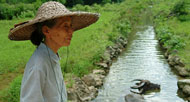
| Issue 59. 6 February 2015 | www.un.org/waterforlifedecade/decade_weekly.shtml |
| This week in focus | Editor’s note
Welcome to the Decade’s Weekly! Every week until 22 March 2015 we bring you the latest news from the International Decade for Action ’Water for Life’ 2005-2015. Please feel free to share this newsletter. You can also access this newsletter online. Tip of the week
For the 2015 UN-Water International Zaragoza Conference and in preparation for World Water Day 2015, the UN-Water Decade Programme on Advocacy and Communication (UNW-DPAC) has compiled a series of case studies in relation to risk management; water resources management and scarcity; water, sanitation and hygiene (WASH) and water quality. |
| #Wastewater
UN-Water Report Calls for Wastewater Focus in Post-2015 Agenda Only 20 percent of global wastewater is currently being treated, leaving low-income countries hardest hit by contaminated water supplies and disease, according to the UN report which encourages governments to see treated wastewater as a valuable resource, and a priority for the post-2015 development agenda. This is accompanied by the realization that the focus on drinking-water and sanitation without due attention being paid to wastewater may have exacerbated some of the water quality problems seen globally. It is increasingly being recognized that the issues of wastewater management and water quality have cross-linkages with a range of other water- and non-water issues, not least in respect of the water, energy and food nexus. It has also been acknowledged that wastewater management clearly plays a role in achieving future water security in a world where water stress will increase. Against this backdrop, there is an emerging consensus on the need for a dedicated water goal in the post-2015 Development Agenda, one which includes explicit recognition of the importance of good wastewater management and its contribution to protecting water quality. The report ’Wastewater Management- A UN-Water Analytical Brief’ looks at some of the problems caused by the neglect of wastewater management, but also at the benefits and opportunities that can be realized through proper attention to this area, and highlights why it is crucial that wastewater management and water quality stop being the ’poor relations’ and receive attention in their own right. |
| In the news | Forthcoming events |
|
#WRMUNESCO-IHE and World Resources Institute partner on Water Resources Management
On 20 January 2015, the World Resources Institute (WRI) and UNESCO-IHE signed a Memorandum of Understanding on Water Resources Management for a duration of five years. Specifically, the partners will use their global networks to strengthen each other’s work, collaborate on linking the Aqueduct Monitor of WRI to UNESCO-IHE's Water Accounting System and explore the possibilities of developing new joint products. The Aqueduct monitor provides spatially explicit information on water stress (drought), flood and other types of risks based on a global model. The joint effort will build upon these water information products and further enhance global impact of either product. On 30 January 2015, a group of United Nations human rights experts urged the international community to rapidly provide all necessary funding and assistance to the Government of Malawi and humanitarian actors in response to some of the worst flooding in the country in living memory. Flooding has also affected Madagascar and Mozambique where international assistance is crucial to scale up responses. "Safe water, sanitation and hygiene must be provided urgently for the survival of those affected, prioritizing the most vulnerable groups, but also for the prevention of water-related diseases such as cholera and malaria," said Léo Heller, Special Rapporteur on the human right to water and sanitation. This High-level Expert Consultation Meeting on Groundwater Governance, hosted by UNESCO, took place on 3-4 February 2015. The invited experts contributed to the preparation of the final products of the Groundwater Governance Project: (i) the Global Diagnostic on Groundwater Governance; (ii) the Shared Vision on Groundwater Governance, and (iii) the Global Framework for Action on Groundwater Governance.The project Groundwater Governance: A Global Framework for Action is financed by the Global Environment Facility (GEF) and jointly executed by UNESCO’s International Hydrological Programme (IHP), the Food and Agricultural Organization of the United Nations (FAO), the International Association of Hydrogeologists (IAH) and the World Bank. The project's goal is to highlight the urgent need for improved governance of groundwater resources and to identify and promote globally valid principles for the governance of these resources at different levels. |
#Wetlands Webinar Learning from wetlands - the case for dry soils
Date: 12 February 2015 The webinar, which is targeted towards Focal Points, national biodiversity managers, sustainable land management experts and other technical specialists in the African region, will include presentations on reducing soil carbon emissions in peatlands and other wetlands, and provide an opportunity for discussions with experts on opportunities and challenges. Outcomes from the webinar will include the identification of priority actions to enhance the consideration of soil biodiversity and carbon for the implementation of the Convention on Biological Diversity. Date: 17-20 February 2015 The intergovernmental negotiations on post-2015 development agenda will take place over several sessions starting in January 2015. After the first stocktaking session which took place from 19-21 January 2015, this second session will take place on 17-20 February 2015, and focus on the Declaration. Side events organized by Member States, major groups and other stakeholders, UN system and other intergovernmental organizations, will be held during this session. Date: 23 - 27 February 2015 The workshop will focus on regional experiences in the use of: (i) integrated marine and coastal area management toward achieving Aichi Biodiversity Targets 6 and 11 in a holistic manner, and (ii) scientific and technical tools in support of the Aichi Biodiversity Targets, such as the description of ecologically or biologically significant marine areas. The SOI is a global platform to build partnerships and enhance capacity to achieve the Aichi Biodiversity Targets related to marine and coastal biodiversity (in particular Targets 6 and 11) |
